Unit 12 Life is full of the unexpected. Section B (1a~1e) 课件(共26张PPT,内嵌音频)2023-2024学年人教版英语九年级全一册
文档属性
| 名称 | Unit 12 Life is full of the unexpected. Section B (1a~1e) 课件(共26张PPT,内嵌音频)2023-2024学年人教版英语九年级全一册 | 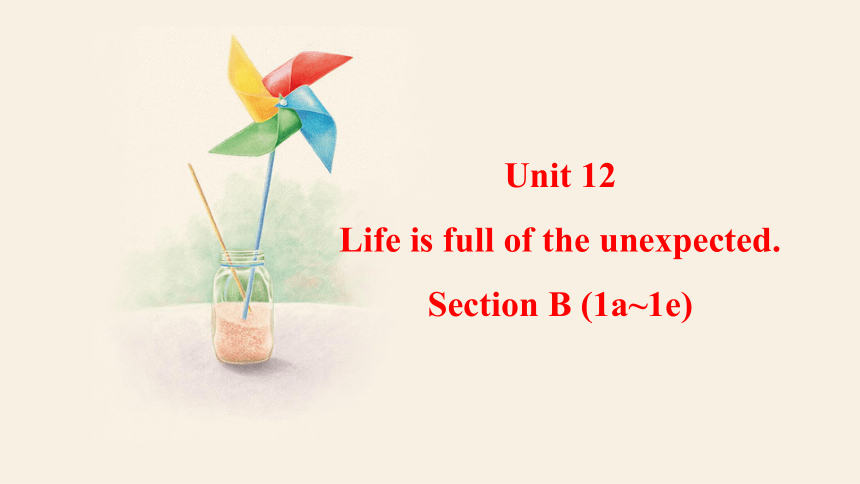 | |
| 格式 | pptx | ||
| 文件大小 | 8.5MB | ||
| 资源类型 | 教案 | ||
| 版本资源 | 人教新目标(Go for it)版 | ||
| 科目 | 英语 | ||
| 更新时间 | 2023-12-13 13:17:28 | ||
图片预览

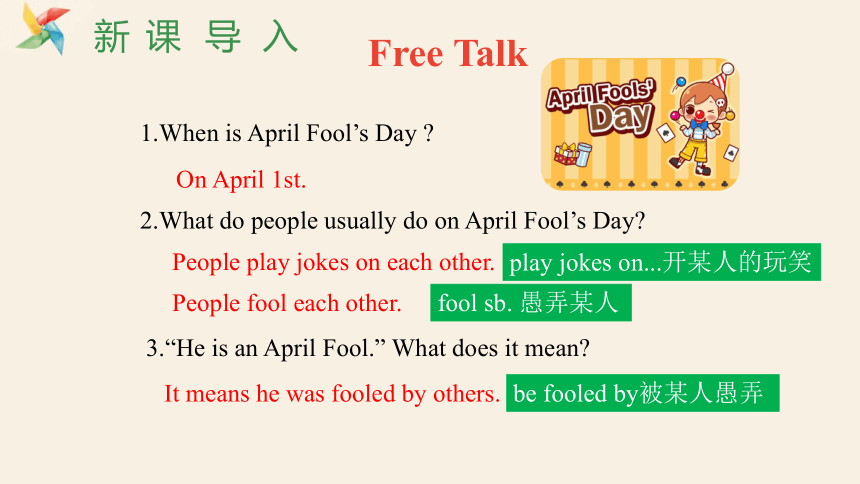
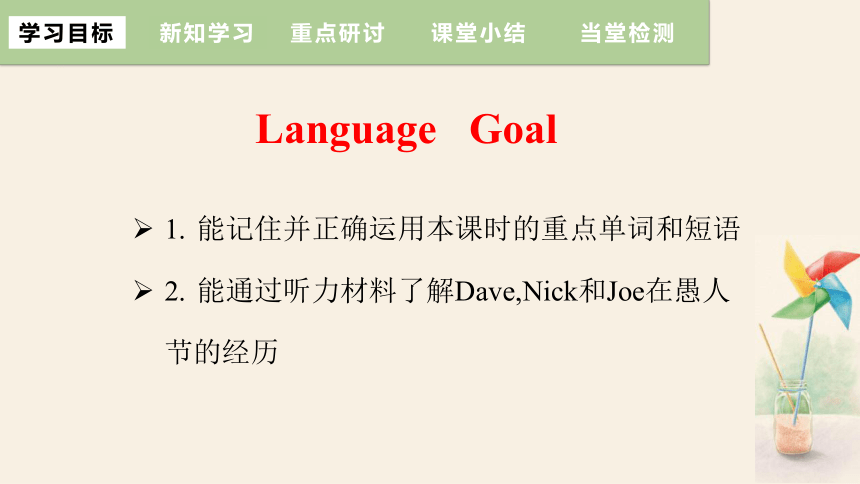
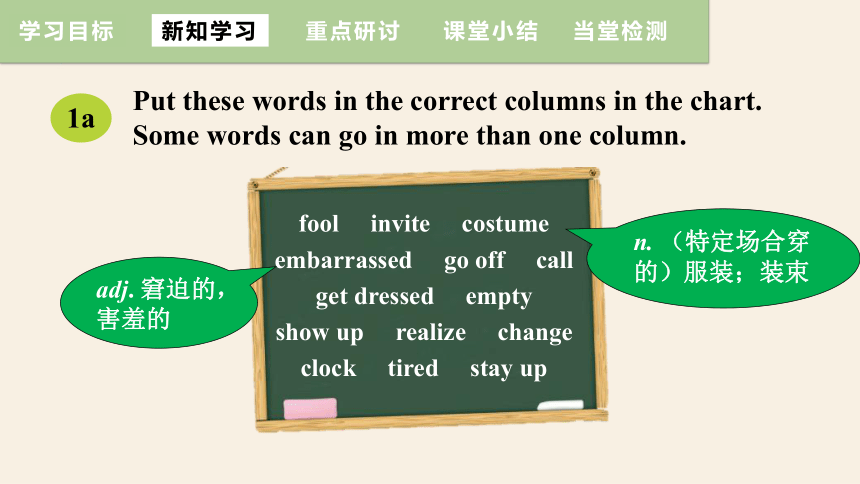
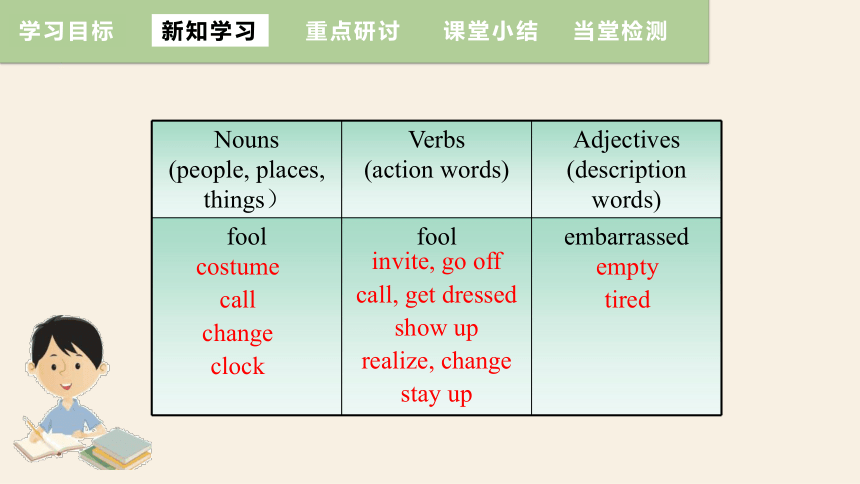
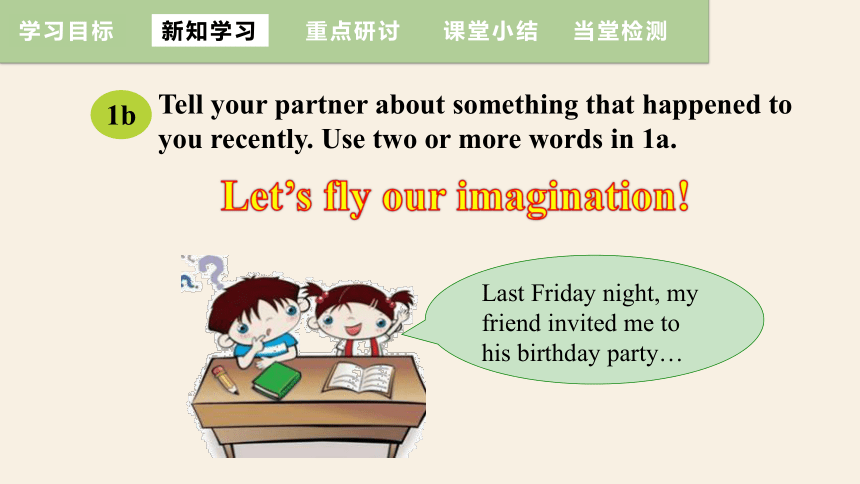
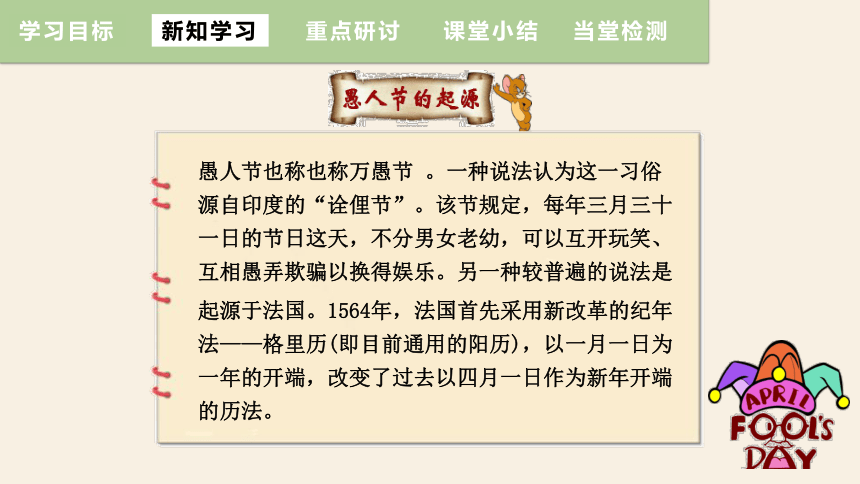
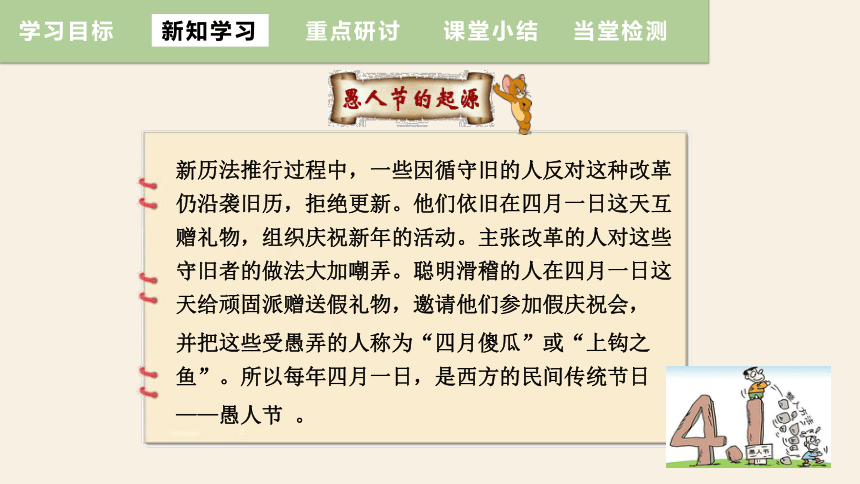
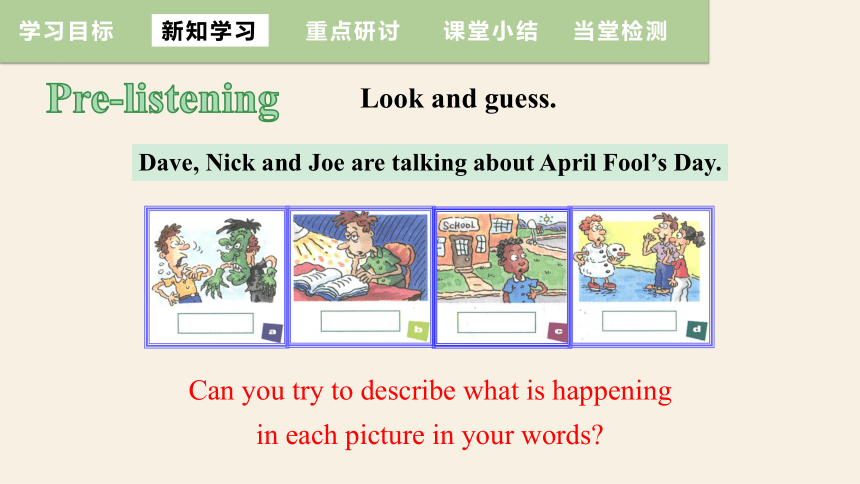
文档简介
(共26张PPT)
Unit 12
Life is full of the unexpected.
Section B (1a~1e)
新
课
导
入
Free Talk
On April 1st.
People play jokes on each other.
People fool each other.
It means he was fooled by others.
play jokes on...开某人的玩笑
fool sb. 愚弄某人
be fooled by被某人愚弄
1.When is April Fool’s Day
2.What do people usually do on April Fool’s Day
3.“He is an April Fool.” What does it mean
Language Goal
新知学习
课堂小结
当堂检测
学习目标
重点研讨
1. 能记住并正确运用本课时的重点单词和短语
2. 能通过听力材料了解Dave,Nick和Joe在愚人节的经历
新知学习
课堂小结
当堂检测
学习目标
重点研讨
1a
Put these words in the correct columns in the chart. Some words can go in more than one column.
fool invite costume embarrassed go off call
get dressed empty
show up realize change clock tired stay up
n. (特定场合穿的)服装;装束
adj. 窘迫的,害羞的
新知学习
课堂小结
当堂检测
学习目标
重点研讨
Nouns (people, places, things) Verbs (action words) Adjectives
(description words)
fool fool embarrassed
invite, go off
call, get dressed
show up
realize, change
stay up
costume
call
change
clock
empty
tired
新知学习
课堂小结
当堂检测
学习目标
重点研讨
1b
Tell your partner about something that happened to you recently. Use two or more words in 1a.
Let’s fly our imagination!
Last Friday night, my friend invited me to his birthday party…
新知学习
课堂小结
当堂检测
学习目标
重点研讨
愚人节也称也称万愚节 。一种说法认为这一习俗源自印度的“诠俚节”。该节规定,每年三月三十一日的节日这天,不分男女老幼,可以互开玩笑、互相愚弄欺骗以换得娱乐。另一种较普遍的说法是
起源于法国。1564年,法国首先采用新改革的纪年法——格里历(即目前通用的阳历),以一月一日为一年的开端,改变了过去以四月一日作为新年开端的历法。
新知学习
课堂小结
当堂检测
学习目标
重点研讨
新历法推行过程中,一些因循守旧的人反对这种改革仍沿袭旧历,拒绝更新。他们依旧在四月一日这天互赠礼物,组织庆祝新年的活动。主张改革的人对这些守旧者的做法大加嘲弄。聪明滑稽的人在四月一日这天给顽固派赠送假礼物,邀请他们参加假庆祝会,
并把这些受愚弄的人称为“四月傻瓜”或“上钩之鱼”。所以每年四月一日,是西方的民间传统节日
——愚人节 。
新知学习
课堂小结
当堂检测
学习目标
重点研讨
Pre-listening
Dave, Nick and Joe are talking about April Fool’s Day.
Can you try to describe what is happening
in each picture in your words
Look and guess.
新知学习
课堂小结
当堂检测
学习目标
重点研讨
Pre-listening
The boy was very_______, because he thought he had met monster.
scared
He was very__________
because he ___________
all night studying.
tired
had stayed up
Look and guess.
新知学习
课堂小结
当堂检测
学习目标
重点研讨
I thought the boy went to the_______________, because he wore a __________, but he was __________ ,he was the only one wearing a costume. When he got there, he found that his friend ____________him.
The boy went to school early, because the school was________.
Maybe he realized that someone __________
him and ____________the clock earlier.
empty
had changed
costume party
costume
embarrassed
had fooled
had fooled
新知学习
课堂小结
当堂检测
学习目标
重点研讨
1c
Dave, Nick and Joe are talking about April Fool’s Day. Listen and write each person’s name under the correct picture.
No name
Joe
Nick
Dave
新知学习
课堂小结
当堂检测
学习目标
重点研讨
What’s the funny thing about Dave
Why did Nick go to school earlier
What did Joe do when he knew the test
Did Joe get a good mark in that test
He was the only person wearing a costume in the “party”, for his friends tricked him.
His clock had been changed by his brother to an hour earlier.
He stayed up all night studying and was tired.
We don’t know, for there is no test at all.
Listen again. Answer the questions.
新知学习
课堂小结
当堂检测
学习目标
重点研讨
1d
Listen again. Who says each of the phrases below Write D for Dave, N for Nick and J for Joe.
1. _____ a costume party
2. _____ my alarm went off
3. _____ stayed up all night
D
N
J
4. _____ was tired
5. _____ was really embarrassed
6. _____ the other kids showed up
D
N
J
新知学习
课堂小结
当堂检测
学习目标
重点研讨
Consolidation
What happened first: His friend________ him to a ________party.
What happened next: When he_____ there,he found that it________ a costume party. He was the only person ________a costume. He was really ____________.
What he realized: His ________had fooled him
Dave
invited
costume
got
wasn’t
wearing
embarrassed
friend
Complete the blanks.
新知学习
课堂小结
当堂检测
学习目标
重点研讨
Consolidation
Nick
What happened first: When his alarm clock_________ , he got up, took a _________ , got _________, and went to _________ .
What happened next: When he got to school, the school was ______ . An hour later, other kids_________ .
What he realized: His _________ had fooled him.
went off
shower
dressed
school
empty
showed up
brother
Complete the blanks.
新知学习
课堂小结
当堂检测
学习目标
重点研讨
Consolidation
What happened first: His friend _________ him and told him they had a _________ test the next day.
What happened next: By the time he got to math class; he was ____ because he_______ all night _______ .
What he realized: He found that his ______had fooled him,they _________ a test at all.
Joe
called
math
tired
stay up
studying
friend
didn’t have
Complete the blanks.
新知学习
课堂小结
当堂检测
学习目标
重点研讨
1e
Tell April Fool’s Day stories in your group.
Use the information in 1c and 1d.
What happened to Dave on April Fool’s Day
Well, a friend invited him to a costume party …
......
......
Joe
Nick
Dave
新知学习
课堂小结
当堂检测
学习目标
重点研讨
Groupwork
在愚人节,你愚弄过别人或被别人愚弄过吗?把你的经历讲给小组成员听吧。可参考下面的问题:
Have you ever fooled someone or have been fooled by someone
How did you feel when someone fooled you
What did he or she do when you fooled him/her
Do you think it is good to fool someone
When Where Who What How
新知学习
课堂小结
当堂检测
学习目标
重点研讨
Language points
1
fool n. 傻瓜;愚人;受骗者 ;vt. 愚弄,欺骗;
He isn't a fool.他不是一个傻瓜。
He ___________ by his friend on April Fool’s Day.
愚人节那天他被他的朋友愚弄了。
Don't ______ your parents.不要欺骗你的父母。
was fooled
fool
【短语】make a fool of … 取笑;捉弄
adj. foolish,意为“傻的;愚蠢的”,强调不聪明的。
It was very foolish of you to park the car near the bus stop.
你真愚蠢,竟然把车停在公共汽车站附近。
新知学习
课堂小结
当堂检测
学习目标
重点研讨
2
embarrassed adj. 窘迫的; 害羞的;尴尬的
She looked a bit ______________.
她看起来有点尴尬。
embarrassing adj. 使人尴尬的,令人为难的。
That was an ______________situation for her.
那种情形让她难堪。
embarrassed
embarrassing
【注意】
通常情况下,-ing形式表示“令人……的”;-ed形式表示“(人)感到……的”。embarrass 动词,意为“使窘迫”; embarrassed常用于描述人,通常作表语;embarrassing常用于描述事物,作定语或表语。
新知学习
课堂小结
当堂检测
学习目标
重点研讨
3
What happened to Dave on April Fool’s Day
在愚人节那天,戴夫发生了什么事?
happen是不及物动词,没有被动语态。What’s happened = What has happened
已经发生了什么事?
新知学习
课堂小结
当堂检测
学习目标
重点研讨
【拓展】
(1) sth.+ happen +时间/地点,意为“某时/某地发生了某事”。An accident happened in our neighborhood just now.
刚刚我家附近发生了一起事故。
(2) sth.+ happen to sb.意为“某人发生了某事”。
A car accident happened to Jim yesterday.
吉姆昨天发生了一起车祸。
(3) sb.+ happen to do sth.意为“某人碰巧做某事”。
I happened to hear that interesting story.
我碰巧听到了那个有趣的故事。
重要句型:
What’s happened = What has happened
(1) sth.+ happen +时间/地点
(2) sth.+ happen to sb.
(3) sb.+ happen to do sth.
重要单词/短语:
fool n. 傻瓜;愚人;受骗者
vt. 愚弄,欺骗
make a fool of … 取笑embarrassed adj. 局促不安的;为难的;尴尬的
embarrassing adj. 使人尴尬的,令人为难的
Unit 12
Section B
(1a~1e)
新知学习
课堂小结
当堂检测
学习目标
重点研讨
新知学习
课堂小结
当堂检测
学习目标
重点研讨
一、词汇。
1.I’m a f_____; I left my bag in the taxi.
2.There is nothing in the box. It’s e______.
3.There is going to be a c______ party in the school and I need
some unusual clothes and masks(面具).
4.On April Fool’s Day, we can hear many different kinds of
j_____.
5.It’s Peter’s 18th birthday, he got d______ in red.
ool
mpty
ostume
okes
ressed
新知学习
课堂小结
当堂检测
学习目标
重点研讨
三、用所给词适当形式填空。
1.It's _______ (fool) of him to believe the joke.
2.She took a quick shower and got ________ (dress).
3.He invited me ________ (go) for a picnic, but I had no time.
4.When he got to school, he found he was _______ (fool).
5.The boy is ____________ by the ___________ news. (embarrass)
foolish
dressed
to go
fooled
embarrassed
embarrassing
Unit 12
Life is full of the unexpected.
Section B (1a~1e)
新
课
导
入
Free Talk
On April 1st.
People play jokes on each other.
People fool each other.
It means he was fooled by others.
play jokes on...开某人的玩笑
fool sb. 愚弄某人
be fooled by被某人愚弄
1.When is April Fool’s Day
2.What do people usually do on April Fool’s Day
3.“He is an April Fool.” What does it mean
Language Goal
新知学习
课堂小结
当堂检测
学习目标
重点研讨
1. 能记住并正确运用本课时的重点单词和短语
2. 能通过听力材料了解Dave,Nick和Joe在愚人节的经历
新知学习
课堂小结
当堂检测
学习目标
重点研讨
1a
Put these words in the correct columns in the chart. Some words can go in more than one column.
fool invite costume embarrassed go off call
get dressed empty
show up realize change clock tired stay up
n. (特定场合穿的)服装;装束
adj. 窘迫的,害羞的
新知学习
课堂小结
当堂检测
学习目标
重点研讨
Nouns (people, places, things) Verbs (action words) Adjectives
(description words)
fool fool embarrassed
invite, go off
call, get dressed
show up
realize, change
stay up
costume
call
change
clock
empty
tired
新知学习
课堂小结
当堂检测
学习目标
重点研讨
1b
Tell your partner about something that happened to you recently. Use two or more words in 1a.
Let’s fly our imagination!
Last Friday night, my friend invited me to his birthday party…
新知学习
课堂小结
当堂检测
学习目标
重点研讨
愚人节也称也称万愚节 。一种说法认为这一习俗源自印度的“诠俚节”。该节规定,每年三月三十一日的节日这天,不分男女老幼,可以互开玩笑、互相愚弄欺骗以换得娱乐。另一种较普遍的说法是
起源于法国。1564年,法国首先采用新改革的纪年法——格里历(即目前通用的阳历),以一月一日为一年的开端,改变了过去以四月一日作为新年开端的历法。
新知学习
课堂小结
当堂检测
学习目标
重点研讨
新历法推行过程中,一些因循守旧的人反对这种改革仍沿袭旧历,拒绝更新。他们依旧在四月一日这天互赠礼物,组织庆祝新年的活动。主张改革的人对这些守旧者的做法大加嘲弄。聪明滑稽的人在四月一日这天给顽固派赠送假礼物,邀请他们参加假庆祝会,
并把这些受愚弄的人称为“四月傻瓜”或“上钩之鱼”。所以每年四月一日,是西方的民间传统节日
——愚人节 。
新知学习
课堂小结
当堂检测
学习目标
重点研讨
Pre-listening
Dave, Nick and Joe are talking about April Fool’s Day.
Can you try to describe what is happening
in each picture in your words
Look and guess.
新知学习
课堂小结
当堂检测
学习目标
重点研讨
Pre-listening
The boy was very_______, because he thought he had met monster.
scared
He was very__________
because he ___________
all night studying.
tired
had stayed up
Look and guess.
新知学习
课堂小结
当堂检测
学习目标
重点研讨
I thought the boy went to the_______________, because he wore a __________, but he was __________ ,he was the only one wearing a costume. When he got there, he found that his friend ____________him.
The boy went to school early, because the school was________.
Maybe he realized that someone __________
him and ____________the clock earlier.
empty
had changed
costume party
costume
embarrassed
had fooled
had fooled
新知学习
课堂小结
当堂检测
学习目标
重点研讨
1c
Dave, Nick and Joe are talking about April Fool’s Day. Listen and write each person’s name under the correct picture.
No name
Joe
Nick
Dave
新知学习
课堂小结
当堂检测
学习目标
重点研讨
What’s the funny thing about Dave
Why did Nick go to school earlier
What did Joe do when he knew the test
Did Joe get a good mark in that test
He was the only person wearing a costume in the “party”, for his friends tricked him.
His clock had been changed by his brother to an hour earlier.
He stayed up all night studying and was tired.
We don’t know, for there is no test at all.
Listen again. Answer the questions.
新知学习
课堂小结
当堂检测
学习目标
重点研讨
1d
Listen again. Who says each of the phrases below Write D for Dave, N for Nick and J for Joe.
1. _____ a costume party
2. _____ my alarm went off
3. _____ stayed up all night
D
N
J
4. _____ was tired
5. _____ was really embarrassed
6. _____ the other kids showed up
D
N
J
新知学习
课堂小结
当堂检测
学习目标
重点研讨
Consolidation
What happened first: His friend________ him to a ________party.
What happened next: When he_____ there,he found that it________ a costume party. He was the only person ________a costume. He was really ____________.
What he realized: His ________had fooled him
Dave
invited
costume
got
wasn’t
wearing
embarrassed
friend
Complete the blanks.
新知学习
课堂小结
当堂检测
学习目标
重点研讨
Consolidation
Nick
What happened first: When his alarm clock_________ , he got up, took a _________ , got _________, and went to _________ .
What happened next: When he got to school, the school was ______ . An hour later, other kids_________ .
What he realized: His _________ had fooled him.
went off
shower
dressed
school
empty
showed up
brother
Complete the blanks.
新知学习
课堂小结
当堂检测
学习目标
重点研讨
Consolidation
What happened first: His friend _________ him and told him they had a _________ test the next day.
What happened next: By the time he got to math class; he was ____ because he_______ all night _______ .
What he realized: He found that his ______had fooled him,they _________ a test at all.
Joe
called
math
tired
stay up
studying
friend
didn’t have
Complete the blanks.
新知学习
课堂小结
当堂检测
学习目标
重点研讨
1e
Tell April Fool’s Day stories in your group.
Use the information in 1c and 1d.
What happened to Dave on April Fool’s Day
Well, a friend invited him to a costume party …
......
......
Joe
Nick
Dave
新知学习
课堂小结
当堂检测
学习目标
重点研讨
Groupwork
在愚人节,你愚弄过别人或被别人愚弄过吗?把你的经历讲给小组成员听吧。可参考下面的问题:
Have you ever fooled someone or have been fooled by someone
How did you feel when someone fooled you
What did he or she do when you fooled him/her
Do you think it is good to fool someone
When Where Who What How
新知学习
课堂小结
当堂检测
学习目标
重点研讨
Language points
1
fool n. 傻瓜;愚人;受骗者 ;vt. 愚弄,欺骗;
He isn't a fool.他不是一个傻瓜。
He ___________ by his friend on April Fool’s Day.
愚人节那天他被他的朋友愚弄了。
Don't ______ your parents.不要欺骗你的父母。
was fooled
fool
【短语】make a fool of … 取笑;捉弄
adj. foolish,意为“傻的;愚蠢的”,强调不聪明的。
It was very foolish of you to park the car near the bus stop.
你真愚蠢,竟然把车停在公共汽车站附近。
新知学习
课堂小结
当堂检测
学习目标
重点研讨
2
embarrassed adj. 窘迫的; 害羞的;尴尬的
She looked a bit ______________.
她看起来有点尴尬。
embarrassing adj. 使人尴尬的,令人为难的。
That was an ______________situation for her.
那种情形让她难堪。
embarrassed
embarrassing
【注意】
通常情况下,-ing形式表示“令人……的”;-ed形式表示“(人)感到……的”。embarrass 动词,意为“使窘迫”; embarrassed常用于描述人,通常作表语;embarrassing常用于描述事物,作定语或表语。
新知学习
课堂小结
当堂检测
学习目标
重点研讨
3
What happened to Dave on April Fool’s Day
在愚人节那天,戴夫发生了什么事?
happen是不及物动词,没有被动语态。What’s happened = What has happened
已经发生了什么事?
新知学习
课堂小结
当堂检测
学习目标
重点研讨
【拓展】
(1) sth.+ happen +时间/地点,意为“某时/某地发生了某事”。An accident happened in our neighborhood just now.
刚刚我家附近发生了一起事故。
(2) sth.+ happen to sb.意为“某人发生了某事”。
A car accident happened to Jim yesterday.
吉姆昨天发生了一起车祸。
(3) sb.+ happen to do sth.意为“某人碰巧做某事”。
I happened to hear that interesting story.
我碰巧听到了那个有趣的故事。
重要句型:
What’s happened = What has happened
(1) sth.+ happen +时间/地点
(2) sth.+ happen to sb.
(3) sb.+ happen to do sth.
重要单词/短语:
fool n. 傻瓜;愚人;受骗者
vt. 愚弄,欺骗
make a fool of … 取笑embarrassed adj. 局促不安的;为难的;尴尬的
embarrassing adj. 使人尴尬的,令人为难的
Unit 12
Section B
(1a~1e)
新知学习
课堂小结
当堂检测
学习目标
重点研讨
新知学习
课堂小结
当堂检测
学习目标
重点研讨
一、词汇。
1.I’m a f_____; I left my bag in the taxi.
2.There is nothing in the box. It’s e______.
3.There is going to be a c______ party in the school and I need
some unusual clothes and masks(面具).
4.On April Fool’s Day, we can hear many different kinds of
j_____.
5.It’s Peter’s 18th birthday, he got d______ in red.
ool
mpty
ostume
okes
ressed
新知学习
课堂小结
当堂检测
学习目标
重点研讨
三、用所给词适当形式填空。
1.It's _______ (fool) of him to believe the joke.
2.She took a quick shower and got ________ (dress).
3.He invited me ________ (go) for a picnic, but I had no time.
4.When he got to school, he found he was _______ (fool).
5.The boy is ____________ by the ___________ news. (embarrass)
foolish
dressed
to go
fooled
embarrassed
embarrassing
同课章节目录
- Unit 1 How can we become good learners.
- Section A
- Section B
- Unit 2 I think that mooncakes are delicious!
- Section A
- Section B
- Unit 3 Could you please tell me where the restroom
- Section A
- Section B
- Unit 4 I used to be afraid of the dark.
- Section A
- Section B
- Unit 5 What are the shirts made of?
- Section A
- Section B
- Review of Units 1-5
- Unit 6 When was it invented?
- Section A
- Section B
- Unit 7 Teenagers should be allowed to choose their
- Section A
- Section B
- Unit 8 It must belong to Carla.
- Section A
- Section B
- Unit 9 I like music that I can dance to.
- Section A
- Section B
- Unit 10 You're supposed to shake hands.
- Section A
- Section B
- Review of Units 6-10
- Unit 11 Sad movies make me cry.
- Section A
- Section B
- Unit 12 Life is full of the unexpected
- Section A
- Section B
- Unit 13 We're trying to save the earth!
- Section A
- Section B
- Unit 14 I remember meeting all of you in Grade 7.
- Section A
- Section B
- Review of Units 11-14
